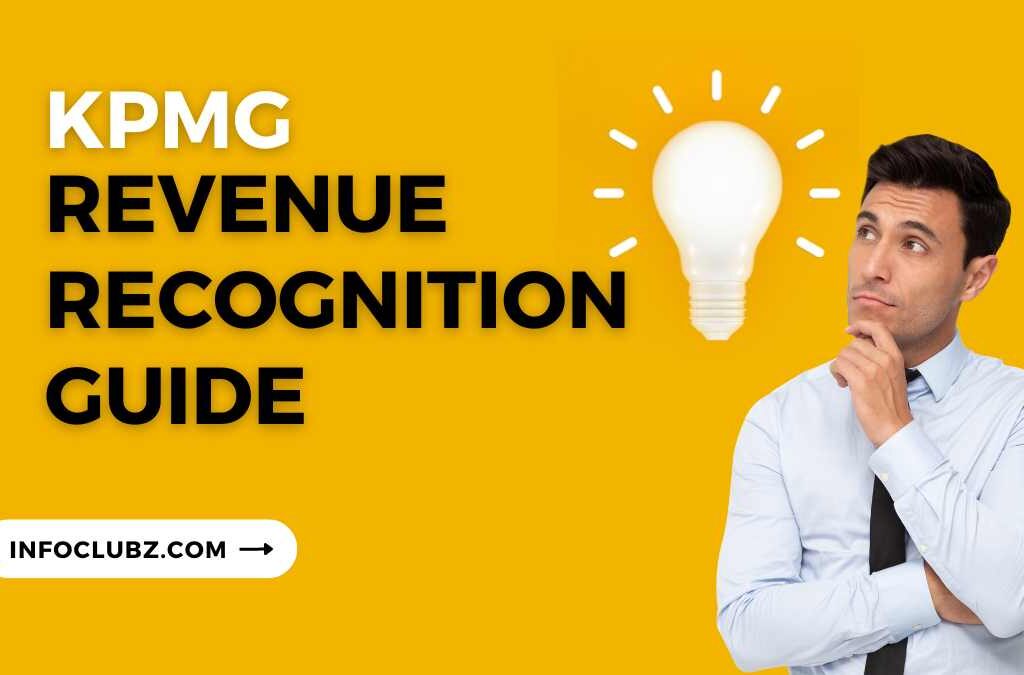- Introduction : KPMG Revenue Recognition Guide
- Understanding Revenue Recognition
- The Role of KPMG in Revenue Recognition
- Principles of Revenue Recognition
- Industry-specific Revenue Recognition Challenges
- The Importance of Compliance
- Common Mistakes in Revenue Recognition
- Conclusion : KPMG Revenue Recognition Guide
- FAQs - KPMG Revenue Recognition Guide
Introduction : KPMG Revenue Recognition Guide
Revenue recognition is crucial in the worlds of finance and accounting. Determining when and how a company registers its revenue in its financial statements is a process. In order for organizations to retain transparency, accuracy, and compliance with accounting standards, it is crucial that they follow the right revenue recognition requirements. We will go into the KPMG Revenue Recognition Guide in this post, examining its importance and guiding principles.

Understanding Revenue Recognition
We will give an outline of revenue recognition and its importance in financial reporting in this section. We will discuss the significance of recording revenue at the appropriate time and under the proper conditions.
The Role of KPMG in Revenue Recognition
Here, we’ll talk about how KPMG, one of the top professional services companies on the planet, helps organizations with revenue recognition. We will highlight KPMG’s experience and track record for offering trustworthy advice to businesses across a range of industries.

Why Choose KPMG
We will outline the benefits of using KPMG for revenue recognition guidance in this paragraph. These factors can include KPMG’s widespread presence, industry-specific expertise, and qualified personnel.
Principles of Revenue Recognition
The essential guidelines that organizations must adhere to when recognizing income are covered in this section. We will go over the concepts included in the KPMG Revenue Recognition Guide, such as the percentage of completion technique, the revenue recognition criteria, and the realization principle.
Realization Principle
We will go into more detail about the realization principle, which stipulates that regardless of when cash is received, revenue should be recorded when it is earned and realizable.
Revenue Recognition Criteria
Here, we’ll go over the standards that companies must adhere to in order to appropriately recognize revenue. Identifying the delivery or performance obligation, figuring out the transaction price, and assigning the amount to various performance duties are frequently part of these criteria.
Percentage of Completion Method
The percentage of completion approach, which enables firms to recognize revenue depending on the development of a lengthy project, will be covered in this subsection.
Industry-specific Revenue Recognition Challenges

When it comes to revenue recognition, each industry has its own set of problems. In this section, we’ll look at some industry-specific difficulties and how KPMG’s advice might be able to help.
Software Market
Recognizing revenue from licensing and subscription models can be difficult for software companies. We will go over how KPMG can help software companies deal with these difficulties.
Construction Industry
Long-term projects and revenue reliant on contracts are frequent issues for construction companies. We’ll go over how KPMG’s experience can guarantee precise revenue recognition in this industry.
The Importance of Compliance
To prevent legal and financial penalties, organizations must adhere to accounting rules. The importance of following KPMG’s revenue recognition principles will be emphasized in this section.
Common Mistakes in Revenue Recognition
Businesses may accidentally make revenue recognition mistakes, which could result in problems. This section will highlight some frequent errors and explain how KPMG can assist businesses in avoiding them.
Conclusion : KPMG Revenue Recognition Guide
In conclusion, the KPMG Revenue Recognition Guide is a useful tool for companies looking to implement sound revenue recognition procedures. Companies can guarantee accuracy and openness in their financial reporting by adhering to accounting standards and KPMG’s professional assistance.
FAQs – KPMG Revenue Recognition Guide
- Q: What is revenue recognition?
- A: Revenue recognition is the process of recording revenue in a company’s financial statements when it is earned and realizable.
- Q: Why is revenue recognition important for businesses?
- A: Proper revenue recognition ensures transparency, accuracy, and compliance with accounting standards.
- Q: What is the role of KPMG in revenue recognition?
- A: KPMG provides expert guidance to businesses in recognizing revenue appropriately and navigating industry-specific challenges.
- Q: How does the realization principle impact revenue recognition?
- A: The realization principle states that revenue should be recognized when it is earned and realizable, not necessarily when cash is received.
- Q: What are some common mistakes in revenue recognition?
- A: Common mistakes include premature recognition of revenue, misinterpreting contract terms, and improper application of revenue recognition criteria.

